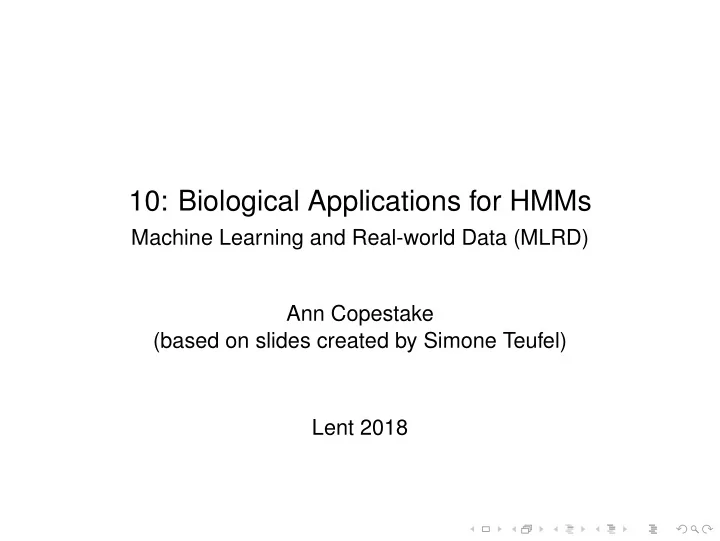

10: Biological Applications for HMMs Machine Learning and Real-world Data (MLRD) Ann Copestake (based on slides created by Simone Teufel) Lent 2018
Last session: dice world and HMM decoding You may by now have written a decoder, i.e., an algorithm that can determine the most likely state sequence of an HMM. From the task before that, you also have code that can estimate the parameters from a labelled HMM sequence. But the dice world is very simple/artificial.
Sequence Learning in the real world HMMs for speech recognition Goal: determine from signal which words were said States: words Observations: acoustic inputs from signal HMMs for parts of speech tagging Goal: determine the parts of speech for text States: parts of speech Observations: words HMM for protein analysis Goal: Find which sections of proteins are in cell membranes States: zones relating to cells Observations: amino acids
HMMs in Automatic Speech Recognition (ASR)
A biological application #MNQGKIWTVVNPAIGIPALLGSVTVIAILVHLAILSHTTWFPAYWQGGVKKAA iiiiiiiiiiiiiiMMMMMMMMMMMMMMMMMMMMMoooooooooooooooooo top line records the amino acid sequence (one character per amino acid) bottom line shows the states: i: inside the cell M: within the cell membrane o: outside the cell Ignoring the start and end sequence states/labels for simplicity.
Eight minutes about biology of cells living organisms are made up of cells multicellular organisms have lots of cells cells are surrounded by a cell membrane cell membranes are lipid bilayers: inside the membrane is hydrophobic (water-hating), the two sides are hydrophilic (water-loving) Jerome Walker - Own work, CC BY 2.5, https://commons.wikimedia.org/w/index.php?curid=915557
Proteins in cell metabolism: proteins make sure the right thing happens in the right place at the right time proteins are made up of amino acid sequences all amino acids have amine and carboxyl groups, but they have very different side chains 20 amino acids are coded for directly by DNA amino acid sequences fold into very complex 3-D protein structure
Alpha helix Dcrjsr - Own work, CC BY 3.0, https://commons.wikimedia.org/w/index.php?curid=9131613
Cell membranes and proteins cell membranes have to let things in and out of the cell (e.g., water, glucose, sodium ions, calcium ions) proteins which are part of the cell membrane allow this (membrane proteins do other things too) By LadyofHats Mariana Ruiz - Own work. https://commons.wikimedia.org/w/index.php?curid=6027169
Transmembrane proteins transmembrane proteins go through the membrane one or more times the regions of the protein which lie inside and outside the cell tend to have more hydrophilic amino acids the regions inside the membranes tend to have more hydrophobic amino acids many transmembrane proteins involve one or more α -helixes in the membrane the channels formed by the protein allow ions and molecules through, in a controlled way
Transmembrane protein: schematic diagram 1. a single transmembrane α -helix (bitopic membrane protein) 2. a polytopic transmembrane α -helical protein 3. a polytopic transmembrane β -sheet protein By Foobar - self-made by Foobar, CC BY 2.5, https://commons.wikimedia.org/w/index.php?curid=802476
Transmembrane protein: Bovine rhodopsin one of the visual pigments accurate structure via x-ray crystallography: difficult and time-consuming, membrane location undetermined By Andrei Lomize - Own work, CC BY-SA 3.0, https://commons.wikimedia.org/w/index.php?curid=34114850
A biological application #MNQGKIWTVVNPAIGIPALLGSVTVIAILVHLAILSHTTWFPAYWQGGVKKAA iiiiiiiiiiiiiiMMMMMMMMMMMMMMMMMMMMMoooooooooooooooooo HMM-based modelling: much, much easier and quicker than x-ray crystallography distinguish interior of membrane from inside/outside of cell simple HMM in practical, but could be improved: more discussion in practical notes
Your Task Task 9: Download the biological dataset and familiarise yourself with it. Modify your code so that your HMM parameter estimation from Task 7 and decoder from Task 8 works with this data format. Use 10-fold cross validation. Evaluate. For Task 10 (next week), you will need to download gephi (graph visualization): please do this in advance of the scheduled session if possible.
Strike action As things stand, the mini-lectures on Feb 23, Feb 26, March 5 and March 12 are cancelled due to strike action. The digital timetable will be updated appropriately: check this! There is a possibility the strike action will be called off. At least some demonstrators will probably continue to work, so practical sessions and ticking are expected to continue.
Recommend
More recommend